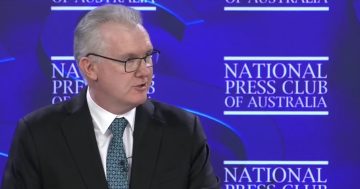According to Benedict Brook* the boss of Australia’s biggest bank said there has been a change in the way we use money not seen since the Spanish flu pandemic.
 Australia’s biggest bank has detected a trend in its customers not seen since the Spanish flu pandemic of 1918.
Australia’s biggest bank has detected a trend in its customers not seen since the Spanish flu pandemic of 1918.
And while we may eventually drift back to old banking habits – such as heading into branches – COVID-19 might have changed one financial mainstay forever.
Commonwealth Bank chief executive officer Matt Comyn said that it was unlikely we would ever use cash in the same way again.
When the pandemic began there were widespread concerns that cash could be one of the surfaces where the virus could be picked up from.
The World Health Organisation has never issued a specific warning against using coins and notes, but the body has advised people to wash their hands particularly after touching surfaces and objects, which would include money.
Speaking to news.com.au on the sidelines of a bank event yesterday, Mr Comyn said in the first few weeks of the pandemic CBA, perhaps counter intuitively, saw increased amounts of cash been withdrawn from ATMs and branches.
The conclusion was some nervous customers were looking to squirrel away physical money.
But since that initial blip, fewer people have been using branches, ATMs and putting cash in their wallets.
“We’ve seen an acceleration of a number of different factors which include both switching to digital and increasing cash levels,” he said.
“It’s been quite a significant reduction in cash levels. It’s like during the Spanish flu pandemic when there was also a big reduction in cash handling.”
The 1918 flu pandemic was the most severe in recent history.
Mr Comyn said that some of the people who had let go of using cash likely wouldn’t go back to using it to the same extent, even when COVID-19 infection concerns faded.
“I suspect cash will rebound somewhat but clearly more and more people prefer to pay electronically and I can’t see it returning back to the previous cash levels.”
“Electronic payments are absolutely going to continue to grow,” he said.
Cash on the way out
The use of coins and notes has been in decline for some time with Australians some of the most enthusiastic adopters of tap and go payments globally.
Recent data from the Reserve Bank of Australia has shown the number of ATM withdrawals reducing from 75 million a month in 2008 to less than 50 million last year.
But when coronavirus struck, ATM transactions fell off a cliff to less than 25 million in March.
In 2007, 75 per cent of transactions were done with cash making up almost half the value of all purchases.
Last year, cash made up little more than a quarter of transactions amounting to around 20 per cent of the dollar figure of purchases.
Prior to the pandemic, the driving force behind recent reductions in cash usage was contactless payments for small value purchases such as coffees.
Although many people have no qualms about moving over to card and phone payments, older Australians in particular still prefer to use physical cash as do households on low incomes.
Money is also resilient and still functions fine even if a bank’s IT systems go down.
Savings soar
Mr Comyn also said saving by households had seen a huge spike as people tucked money away.
“People are becoming more cautious and that’s understandable and rational to have a savings buffer and we’d expect that to continue for a period of time.”
“People will spend money when they have more confidence about there individual picture and confidence around their job.”
Mr Comyn said there had been signs of the economy picking up from the April and May lockdowns but Melbourne going back into restrictions had pulled that back.
“We were feeling quite good. There was better than expected levels of spending activity and we could see people in increasing numbers returning to the workforce and the number of our customers getting Jobseeker was reducing.”
“There is no doubt Melbourne is a setback.”
Nevertheless, the CBA boss said he supported the Government’s suppression strategy and said elimination was “practically very difficult” to achieve.
*Benedict Brook is a news reporter focused on national issues at news.com.au He can be contacted at [email protected]
This article first appeared at news.com.au





